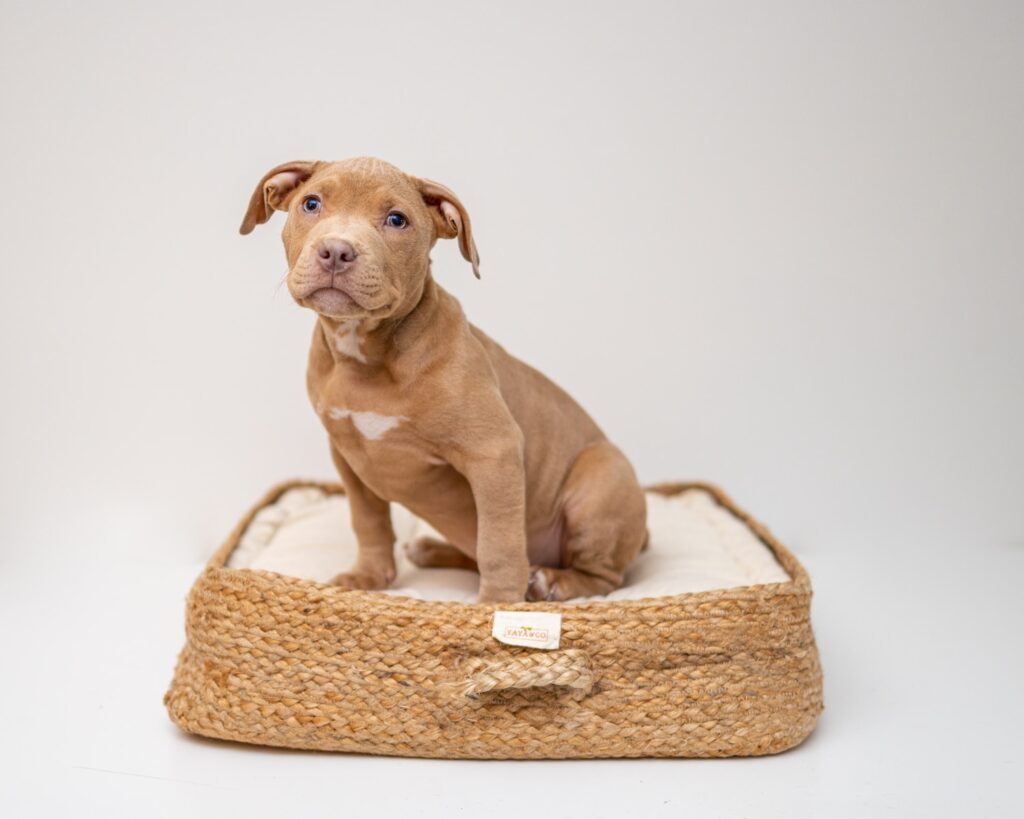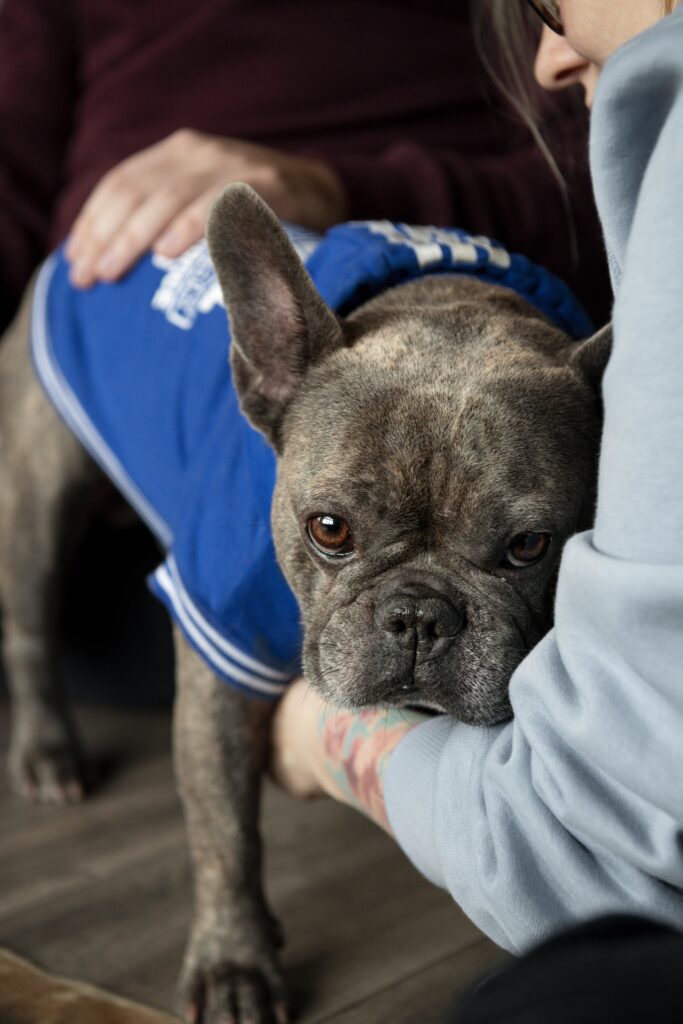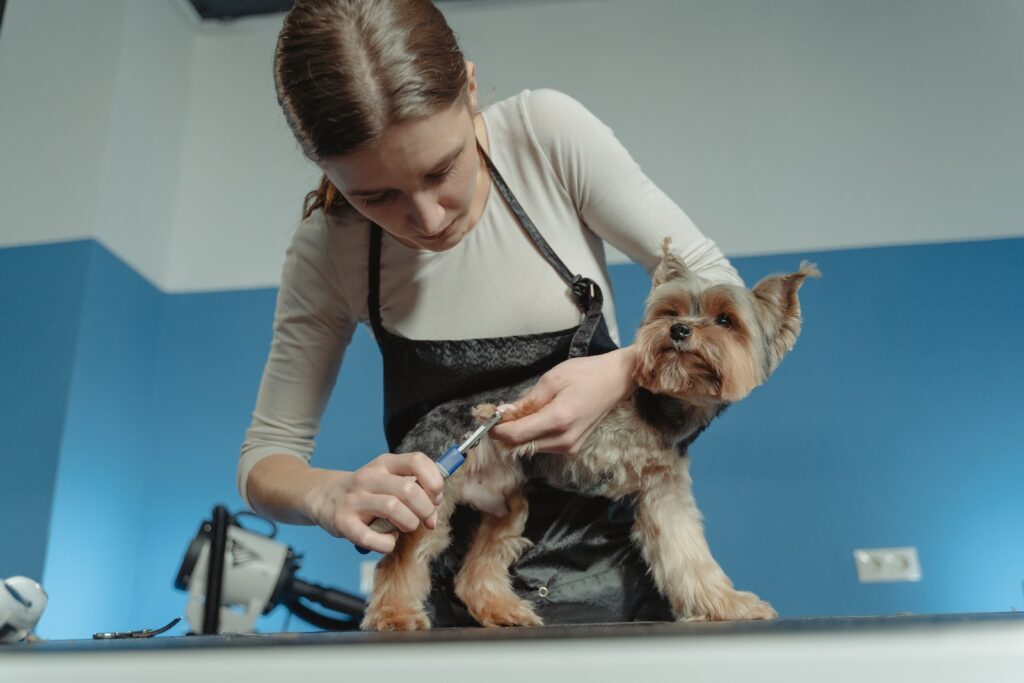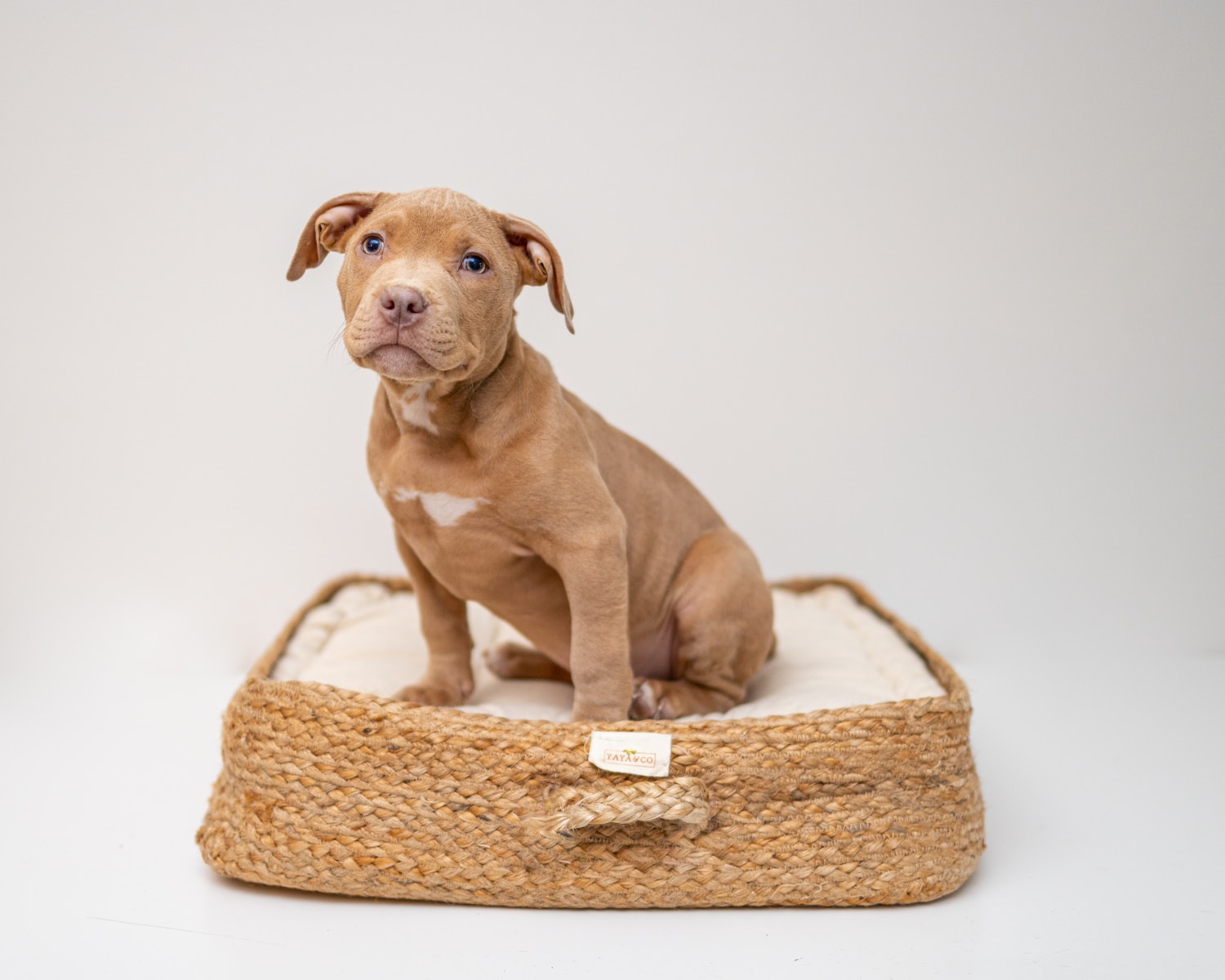Welcoming a Pit Bull puppy into your home marks the commencement of an extraordinary journey—one defined by boundless affection, unwavering loyalty, and the shared promise of a thriving life together. As the custodian of this dynamic and resilient breed, your commitment to their well-being is the cornerstone of a harmonious companionship.
This guide, “Keeping Your Pit Bull Puppy Healthy: Understanding Common Health Concerns and Care Tips,” seeks to be your compass in navigating the intricacies of Pit Bull puppy wellness. In the evolving landscape of canine care, a nuanced understanding of common health concerns and informed care strategies forms the bedrock of responsible ownership.

Our exploration begins with the cornerstone of preventive healthcare—regular veterinary check-ups. Through a professional lens, we examine the significance of routine examinations, vaccinations, and personalized healthcare plans tailored to the unique needs of your Pit Bull puppy. This knowledge serves as a shield against potential health issues, fortifying the foundation of their vitality.
Diving deeper, we unravel the dietary intricacies essential to Pit Bull puppy growth and development. Discerning the nuances of a balanced and nutritious diet lays the groundwork for a lifetime of robust health. Practical insights into portion control, age-appropriate nutrition, and the avoidance of common pitfalls illuminate the path toward optimal well-being.
Physical exercise is not merely a routine but a cornerstone of Pit Bull happiness. Tailoring exercise regimens to the energy levels and developmental stages of your puppy ensures mental stimulation, proper growth, and the prevention of obesity-related health challenges.
In this discourse, dental care emerges as a critical component of holistic health. From introducing your puppy to the habit of regular teeth brushing to incorporating dental chews, we underscore the importance of maintaining oral hygiene as a preventive measure against dental issues.
As we delve into the guide’s core, breed-specific health concerns come under the spotlight. Understanding predispositions such as hip dysplasia and skin allergies empowers you to anticipate and address potential challenges proactively. This section serves as a compass, guiding your role as a vigilant advocate for your Pit Bull’s lifelong well-being.
In essence, “Keeping Your Pit Bull Puppy Healthy” is not just a guide; it’s a pledge to cultivate a robust, enduring partnership. Through the fusion of professional insights and compassionate care, this guide endeavors to equip you with the knowledge needed to navigate the evolving terrain of your Pit Bull puppy’s health, ensuring a future characterized by vitality, happiness, and shared adventures.
Table of Contents
Common Health Problems in Pit Bull Puppies
In the tapestry of canine well-being, an awareness of potential health challenges is instrumental in fortifying the pillars of responsible Pit Bull puppy care. This section delves into the nuanced landscape of common health problems that may affect Pit Bull puppies. By understanding and addressing these issues proactively, we equip ourselves to navigate the path of vigilant guardianship, ensuring our beloved companions lead lives of vitality and comfort. Join us as we explore the intricacies of recognizing, preventing, and managing common health concerns in Pit Bull puppies.

Skin Allergies in Pit Bull Puppies: A Comprehensive Overview
Skin allergies can be a noteworthy concern for Pit Bull puppies, underscoring the importance of keen observation and proactive care. These allergies may manifest in various forms, including but not limited to excessive scratching, visible redness, the onset of rashes, or even noticeable hair loss. As diligent caretakers, it is crucial to be attuned to these potential signs, as they often serve as early indicators of an underlying dermatological issue.
Identification and Observation
Observation becomes a key ally in the early detection of skin allergies. Regularly inspect your Pit Bull puppy’s coat and skin, paying close attention to any changes in texture, color, or the presence of irritation. If you notice your puppy exhibiting signs of discomfort, such as persistent scratching or an alteration in their grooming habits, these could be red flags signaling a potential allergic reaction.
Consulting the Veterinarian
In the event of suspected skin allergies, prompt consultation with a veterinarian is paramount. A veterinary professional possesses the expertise to conduct a thorough examination, identify potential triggers, and formulate an effective treatment plan. This may involve diagnostic tests to pinpoint the specific allergen, allowing for targeted and precise intervention.
Determining Potential Triggers
Understanding the triggers of skin allergies is a crucial step in managing and preventing their recurrence. Allergens can vary widely, ranging from certain foods, environmental factors like pollen or dust mites, to specific grooming products. A comprehensive discussion with your veterinarian can shed light on potential causes, enabling you to implement necessary lifestyle adjustments.
Treatment Modalities
Treatment options for skin allergies may include topical medications, oral antihistamines, or in some cases, dietary changes. The chosen approach will depend on the severity of the allergic reaction and the identified triggers. Your veterinarian will guide you through the most suitable course of action, ensuring the well-being and comfort of your Pit Bull puppy.
Preventive Measures
Preventing skin allergies involves a combination of environmental management and a tailored care routine. Regular grooming, the use of hypoallergenic products, and maintaining a clean living environment can significantly contribute to minimizing the risk of allergic reactions.
Hip Dysplasia in Pit Bull Puppies: A Proactive Approach to Orthopedic Well-being
Hip dysplasia, a prevalent orthopedic concern in Pit Bull puppies, underscores the significance of a vigilant and proactive stance towards their overall musculoskeletal health. Recognizing potential signs and adopting preventative measures are pivotal in ensuring the long-term well-being of these energetic companions.
Early Signs and Vigilance
Signs of hip dysplasia may manifest as subtle discomfort, a noticeable limp, or difficulty in movement. Paying close attention to your Pit Bull puppy’s gait, particularly during periods of activity, can provide early indicators of orthopedic challenges. Should you observe any signs of discomfort or irregularities, prompt consultation with a veterinarian is advised.
Veterinary Assessment and Diagnostic Measures
A veterinarian, equipped with specialized knowledge, can conduct a thorough orthopedic examination to assess the extent of hip dysplasia. Diagnostic tools such as X-rays may be employed to provide a comprehensive understanding of the hip joint structure. Early detection enables timely intervention and the implementation of strategies to manage and mitigate the impact of the condition.
Strategies for Minimizing Risk
While genetic factors play a role in the development of hip dysplasia, certain lifestyle choices can contribute to minimizing the risk. Regular, moderate exercise is essential for maintaining muscle tone and joint flexibility. A balanced diet that supports optimal growth and development, coupled with the maintenance of a healthy weight, can alleviate undue stress on developing hip joints.
Exercise Regimen and Physical Well-being
Tailoring an exercise regimen that accommodates the specific needs of Pit Bull puppies is key. Low-impact activities, such as controlled walks and supervised play, contribute to strengthening muscles and supporting joint health. The goal is to strike a balance that fosters physical well-being without exerting undue strain on developing joints.
Nutritional Considerations
A well-rounded, nutritionally balanced diet is a cornerstone in the prevention of hip dysplasia. Consult with your veterinarian to ensure your Pit Bull puppy receives the appropriate nutrients for their age and developmental stage. Specialized diets containing joint-supporting supplements, as recommended by your veterinarian, may be considered for puppies at a higher risk.
In essence, proactive measures in the form of regular veterinary check-ups, a mindful exercise routine, and a nutritionally sound diet form a collective shield against the challenges posed by hip dysplasia in Pit Bull puppies. By staying attuned to potential signs, engaging in preventative strategies, and collaborating with your veterinarian, you pave the way for a future where your Pit Bull navigates life with agility, comfort, and the exuberance that defines their spirited nature.
Guarding the Heart: Understanding and Addressing Potential Heart Conditions in Pit Bull Puppies
Heart conditions can be a concern for some Pit Bull puppies, necessitating a watchful eye and informed care practices to ensure their cardiovascular well-being. Recognizing symptoms and embracing a routine of regular veterinary check-ups are pivotal steps in early detection and effective management of potential heart-related issues.

Symptoms and Early Indicators
Awareness of potential symptoms is the first line of defense against heart-related problems in Pit Bull puppies. Observing for signs such as coughing, especially during or after physical activity, unexplained fatigue, or irregularities in heartbeat can offer crucial insights. Vigilance in noting changes in behavior or energy levels is paramount for early detection.
Role of Regular Veterinary Check-ups
Regular veterinary check-ups emerge as a cornerstone in the proactive care of Pit Bull puppies susceptible to heart conditions. These appointments provide an opportunity for a thorough cardiovascular examination by a trained professional. A veterinarian can employ diagnostic tools such as auscultation and, if necessary, advanced imaging techniques to assess the heart’s structure and function.
Early Detection and Diagnostic Measures
Early detection of heart conditions allows for prompt intervention and management. In cases where symptoms or breed predispositions warrant, a veterinarian may recommend specialized tests such as echocardiography or electrocardiography to provide a comprehensive understanding of the puppy’s cardiac health. This proactive approach enables tailored care strategies to be implemented, potentially mitigating the progression of heart-related issues.
Management and Lifestyle Considerations
Once a heart condition is identified, management often involves a combination of medication, lifestyle adjustments, and ongoing veterinary monitoring. Your veterinarian may prescribe medications to support heart function and provide guidance on maintaining an optimal living environment. Lifestyle considerations, such as moderating exercise intensity and managing stress, contribute to the overall well-being of a Pit Bull puppy with a heart condition.
Collaboration with the Veterinarian
Establishing a collaborative partnership with your veterinarian is crucial in navigating the complexities of heart conditions. Regular communication, adherence to prescribed medications, and timely reporting of any observed changes in your Pit Bull puppy’s behavior or health status foster a synergistic approach to care.
Tips for Maintaining Overall Health
Healthy Diet and Nutrition: Nourishing the Foundations of Your Pit Bull Puppy’s Well-being
Embarking on a journey of responsible Pit Bull puppy care begins at the bowl, with a steadfast commitment to providing a wholesome and well-balanced diet. The nutritional choices you make lay the foundation for their growth, vitality, and long-term health.
Tailored Nutrition for Optimal Growth
A cornerstone of a Pit Bull puppy’s well-being lies in a diet meticulously tailored to their unique nutritional requirements. Opt for high-quality puppy food designed to support their rapid growth phase. Look for formulations that boast a robust protein profile, ensuring the essential amino acids vital for muscle development.
Protein, Vitamins, and Minerals
Protein takes center stage in your Pit Bull puppy’s diet, serving as the building blocks for strong muscles and a robust immune system. However, a comprehensive nutritional profile extends beyond protein alone. Ensure their diet is rich in a spectrum of vitamins and minerals, such as calcium for bone development, and essential nutrients that foster overall health.
The Role of High-Quality Puppy Food
Investing in high-quality puppy food ensures a balanced blend of ingredients specifically calibrated to meet the nutritional demands of growing Pit Bull puppies. These formulations often incorporate a careful balance of carbohydrates, fats, and micronutrients, providing the energy and support required for their dynamic lifestyle.
Consultation with the Veterinarian
While general guidelines exist, the specific dietary needs of individual Pit Bull puppies may vary. Consulting with a veterinarian is paramount in tailoring a nutrition plan that aligns with your puppy’s age, weight, and health status. Regular check-ups provide an opportunity to reassess their dietary requirements as they progress through different life stages.

Hydration and Healthy Treats
In tandem with a nutritious diet, ensure your Pit Bull puppy has access to fresh, clean water at all times. Hydration is fundamental to various bodily functions, and maintaining optimal water intake is an often-overlooked aspect of canine health. Additionally, choose healthy treats that complement their main meals, avoiding excessive treats high in sugars or fillers.
Grooming and Hygiene: Elevating Your Pit Bull Puppy’s Comfort and Well-being
Maintain a regular grooming routine to keep your puppy clean and comfortable.their coat, cleaning ears, trimming nails, and dental care are essential aspects of their hygiene.
Brushing for Lustrous Coats
Embark on a sensory journey with your Pit Bull puppy through the act of brushing—a practice that extends beyond aesthetics. Regular brushing not only keeps their coat lustrous but also stimulates blood circulation, distributes natural oils, and removes loose fur. This tactile interaction doubles as a bonding experience, strengthening the connection between you and your furry companion.
Ear Cleaning for Auditory Health
In the tapestry of grooming, attention to the ears is a symphony of care. Gently cleaning your Pit Bull puppy’s ears helps prevent the buildup of wax and debris, minimizing the risk of infections. This routine task not only safeguards their auditory health but also fosters a sense of trust as they learn to associate the process with comfort and care.
Nail Trimming for Comfortable Paws
Trimming your puppy’s nails is more than a cosmetic consideration—it’s a key component of their comfort and mobility. Regular nail maintenance prevents overgrowth, which can lead to discomfort and even affect their gait. Approach nail trimming with patience, using specialized clippers or seeking guidance from your veterinarian if you’re new to the process.
Dental Care for a Bright Smile
A radiant smile is not just charming; it’s indicative of oral health. Incorporate dental care into your Pit Bull puppy’s grooming routine, introducing them to the concept of tooth brushing early on. Dental chews and toys can complement this regimen, contributing to strong gums and healthy teeth. Not only does this practice promote oral hygiene, but it also aligns with preventative care, reducing the risk of dental issues down the road.
The Holistic Approach
Grooming and hygiene extend beyond individual tasks; they embody a holistic approach to your Pit Bull puppy’s overall well-being. Each grooming session becomes a canvas for nurturing physical health, bolstering emotional bonds, and instilling a sense of security. It’s an investment in their comfort and a celebration of the unique connection you share.
As you embark on this nutritional odyssey with your Pit Bull puppy, remember that their diet is more than sustenance—it’s an investment in their long-term health and vitality. By prioritizing a well-balanced diet enriched with essential nutrients, you pave the way for a future where your Pit Bull thrives, radiating energy, and embodying the epitome of canine well-being.
Conclusion: Nurturing the Health of Your Pit Bull Puppy
In closing, the stewardship of a Pit Bull puppy transcends the routine tasks of care—it is a covenant of health, an unwritten pact between guardian and companion. The journey is not merely one of understanding potential health concerns but an ongoing commitment to proactive measures that carve a path towards enduring vitality and joy.
Through attentive eyes and a nurturing touch, you become the architect of their well-being, weaving a narrative that encompasses proper nutrition, regular exercise, and vigilant veterinary care. Each choice, from the nutritious kibble in their bowl to the brisk walks that invigorate their spirit, contributes to a mosaic of health that defines their every step.
As the chapters of puppy hood unfold into the tapestry of a lifetime, the resonance of shared moments—the vet visits, the playful antics, the grooming sessions—becomes the heartbeat of your journey together. This isn’t just about addressing health concerns; it’s a celebration of life, an affirmation that, with each act of care, you are crafting a legacy of robust well-being for your Pit Bull companion.
So, as you navigate the nuances of their health, remember that this is more than a duty; it’s a privilege—a journey where the bonds forged and the care bestowed become the cornerstone of a life lived in abundance. With each passing day, you are not just nurturing a Pit Bull puppy; you are nurturing a legacy of health, joy, and an unspoken language of companionship that echoes through the years.
Remember, your veterinarian is your best ally in maintaining your pit bull puppy’s health. Be observant, proactive, and always seek professional advice for any concerns about your puppy’s health.

